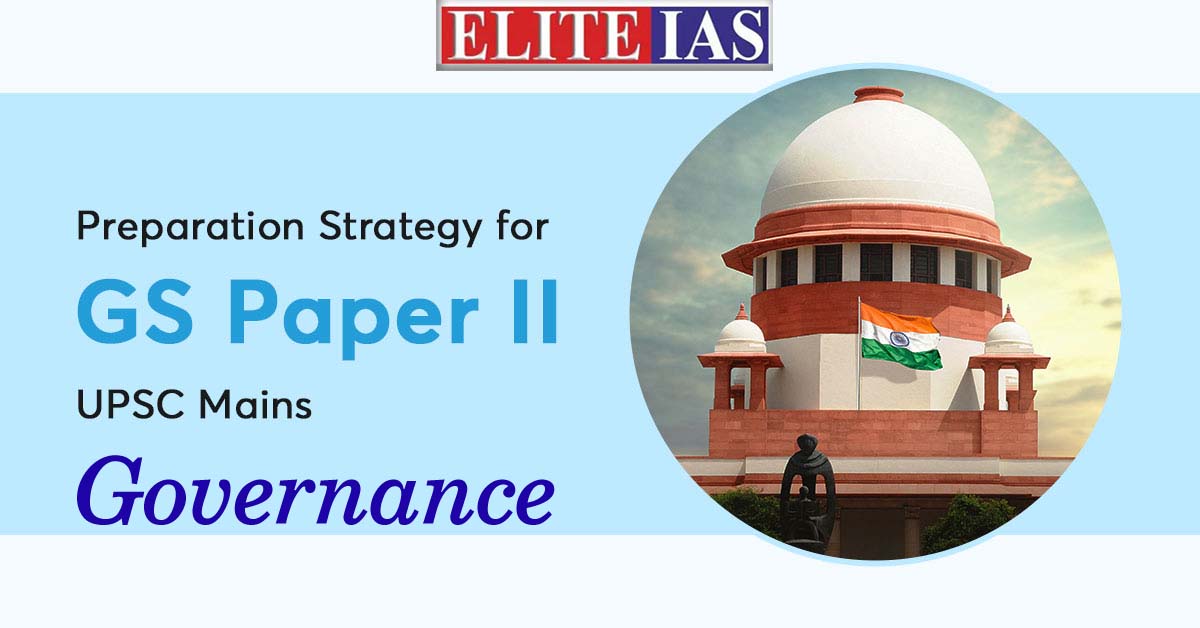
The Governance section in the General Studies Paper 2 (GS Paper 2) of the UPSC Mains examination is an important component that evaluates candidates’ comprehension of governance, constitution, polity, social justice, and international relations. It demands a comprehensive comprehension of India’s political system, administrative machinery, policies, and their implementation. Aspirants intending to excel in this section need a well-structured preparation strategy encompassing various dimensions. UPSC classes in Delhi also covers the Governance part of General Studies in more or so same way.
You Can Read Also: UPSC Exam Pattern
Keep in Mind The Syllabus:
The first step towards efficient preparation is comprehending the syllabus thoroughly. The Governance section of GS Paper 2 broadly addresses the following areas:
- Government policies and interventions for development in various sectors and issues arising from their design and implementation.
- Development processes and the development industry: the role of NGOs, SHGs, various groups and associations, donors, charities, institutional and other stakeholders.
- Welfare schemes for vulnerable sections of the population by the Center and States and the performance of these schemes.
- Mechanisms, laws, institutions, and bodies constituted for protecting and improving these vulnerable sections.
- Issues relating to the development and management of Social Sector/Services relating to Health, Education, and Human Resources.
- Issues relating to the development and management of Social Sector/Services relating to Health, Education, Human Resources, and issues relating to poverty and hunger.
- Important aspects of governance, transparency, and accountability, e-governance- applications, models, successes, limitations, and potential.
- Citizens charters, transparency & accountability, and institutional and other measures.
- Role of civil services in a democracy.
Resources for preparing governance of UPSC mains:
NCERT Books:
These textbooks provide a foundational understanding of Indian polity and governance. Starting from Class IX to XII Political Science texts can offer insights into various aspects of governance, constitutional provisions, and political processes. They assist in building a strong base for understanding complex topics. If you are not comfortable in self-study, you can join any best online coaching for UPSC from your hometown. They have become affordable with quality teaching.
Standard Reference Books:
Books like “Indian Polity” by M. Laxmikanth, “Introduction to the Constitution of India” by D.D. Basu, and “Our Constitution” by Subhash C. Kashyap are viewed as essential. These books explore deeper into the particulars of Indian governance, constitutional principles, and key concepts pertinent for the UPSC examination.
Government Reports and Publications:
Reports such as the Economic Survey, Annual Reports of Ministries, and publications from institutions like NITI Aayog provide valuable insights into government policies, governance challenges, and economic indicators. Analyzing these reports helps in comprehending real-world governance issues and their implications.
Newspapers and Magazines:
Staying up with current affairs is essential for the UPSC examination. Newspapers like The Hindu, Indian Express, and magazines such as Yojana and Kurukshetra provide extensive coverage of governance-related news, policy developments, and analysis. Regular reading of these publications helps in remaining updated with recent events and understanding their implications on governance.
Internet Forums:
Utilizing internet-based resources like PRS India (PRS Legislative Research), Press Information Bureau (PIB), and the official websites of ministries gives access to authentic information, government notifications, and policy updates. These platforms offer a plethora of resources such as reports, policy briefs, and legislative documents that are worthwhile for UPSC preparation.
Preparation Strategy
Thematic Methodology:
A thematic approach to studying governance shows extremely useful in comprehensively addressing its multifaceted topics. By structuring the syllabus into cohesive themes like constitutional provisions, governance issues, social justice initiatives, and international relations, learners can systematically navigate through the scope of the subject matter.
This method allows for a focused examination of each theme, enabling individuals to allocate specific time and resources to look deeply into the associated concepts, explore relevant case studies, and remain abreast of contemporary developments.
By this organized framework, students are able to acquire an in-depth knowledge of governance dynamics, nurturing critical thinking and analytical skills essential for navigating complicated real-world scenarios. Moreover, by contextualizing theoretical knowledge within thematic frameworks, learners can comprehend the practical implications of governance principles, augmenting their ability to contribute meaningfully to societal progress and policy discourse.
Analytical Skills Development:
In the context of GS Paper – 2, particularly within the governance section, the emphasis is solely on sharpening analytical skills over rote learning. Aspirants preparing for this part must prioritize comprehending the fundamental principles, historical contexts, and broader implications associated with diverse governance mechanisms. Instead of solely memorizing facts and figures, a deeper comprehension of the underlying concepts is essential. One effective strategy for cultivating such intellect is through consistent practice in answer writing.
Regular involvement with simulated tests and previous years’ question papers gives valuable chances to refine problem-solving techniques and adeptly manage time constraints. These UPSC mock test help you build confidence and systemize your studies. Through this iterative process, candidates not only enhance their capacity for critical analysis but also develop the flexibility required to navigate the complicated challenges presented in the governance domain.
This approach not only strengthens their preparation for the examination but also provides them with the necessary abilities to critically assess and contribute to contemporary governance discourse and policymaking processes effectively.
The Current Affairs Integration is required:
In the domain of governance studies, the integration of current affairs into preparation is not just helpful but essential due to the dynamic nature of the subject matter. Aspirants intending to do well in this domain must cultivate a habit of consistently remaining updated with recent events, government initiatives, judicial pronouncements, and international developments that bear relevance to governance. This demands the practice of making brief notes on these contemporary occurrences.
By linking these current affairs to the theoretical concepts studied, candidates can develop a holistic understanding of the subject matter. This integration not only enhances their comprehension of governance dynamics but also improves the quality of their answers by providing real-world examples and contexts.
In addition, such an approach develops critical thinking and analytical skills by encouraging aspirants to analyze the practical implications of theoretical concepts in light of ongoing events. Ultimately, the ability to seamlessly incorporate current affairs into governance preparation not only enhances performance in examinations but also provides individuals with the skills necessary to navigate the ever-evolving landscape of governance effectively.
The case studies and Example:
Adding case studies and real-life examples is a potent strategy for enriching answers and exhibiting an in-depth knowledge of governance issues. Through looking into landmark judgments, administrative reforms, and policy implementations, candidates can effectively illustrate key concepts in a tangible manner. These case studies serve as empirical evidence, establishing theoretical discussions in real-world contexts and providing concrete examples of governance principles in action.
In addition, by analyzing the intricacies of these cases, aspirants can exhibit their ability to critically evaluate governance mechanisms and their outcomes. Drawing parallels between theoretical frameworks and practical scenarios not only strengthens the credibility of responses but also demonstrates the candidate’s capacity to apply theoretical knowledge to solve complex governance challenges. This incorporation of case studies and examples not only adds depth to answers but also emphasizes the relevance and applicability of governance theories in addressing contemporary issues.
Ultimately, leveraging case studies and real-life examples elevates the quality of responses and positions candidates as insightful and analytical thinkers capable of navigating the complexities of governance effectively.
Revision and Consolidation:
In the journey of preparation, the significance of regular revision cannot be underestimated; it acts as the cornerstone of effective learning. To this end, it’s imperative to establish structured revision schedules, dedicating ample time to revisit topics addressed previously. Consolidating one’s understanding is equally crucial, and this can be accomplished through various techniques such as mind maps, flowcharts, and mnemonic devices. These tools aid in organizing and summarizing complex information, facilitating easier recall during examinations.
Moreover, it’s essential to address areas of weakness identified through mock tests and feedback sessions, ensuring a balanced and comprehensive revision process. By focusing on these weaker areas, aspirants can shore up their comprehension and boost their overall preparedness. Through consistent and focused revision efforts, aspirants not only reinforce their knowledge but also gain confidence in confronting diverse challenges that may arise during examinations. Thus, revision and consolidation serve as essential pillars in the foundation of successful preparation, paving the way for confidence and competence on the exam day.
Stay Confident and Calm:
Maintaining a positive attitude throughout the preparation voyage and particularly during the examination is crucial for success. It is crucial to nurture a sense of calmness and composure, even in the face of difficult questions or time constraints. Confidence in one’s preparation and adept time management skills play key roles in influencing performance outcomes.
By remaining confident, individuals can approach the examination with a clear mind and a focused manner, allowing them to tackle questions with precision and clarity. Additionally, a calm and composed demeanor enables candidates to navigate through the exam without succumbing to tension or anxiety, thereby optimizing their cognitive abilities and decision-making processes.
Through a combination of self-assurance and a peaceful mindset, aspirants can harness their potential to the fullest extent, maximizing their possibilities of achieving their desired outcomes in the examination. Thus, maintaining confidence and remaining composed serve as guiding principles that not only enhance performance but also contribute to a more fulfilling and rewarding examination experience overall.
The Governance section in GS Paper 2 demands a holistic comprehension of India’s governance structures, constitutional provisions, and contemporary issues. A well-rounded preparation strategy involving conceptual clarity, extensive coverage, current affairs integration, and rigorous practice is indispensable for success. The UPSC Mains test requires consistent work, strategic preparation, and adaptation to changing patterns. These are the keys to acing this portion. By following the outlined preparation strategy diligently, aspirants can enhance their chances of scoring well and realizing their aspirations of serving the nation through administrative roles.




